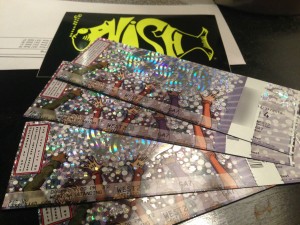Love it or hate it, there is no doubt that technology -- from Ticketmaster's website or mobile apps to Stub Hub, eBay, even our friends at CashOrTrade.org -- has transformed the concert ticket landscape. And still ticketing remains one of the hottest of buttons for live music fanatics, particularly as it relates to high demand events.
Multiple parties all have a stake -- ticket agencies, bands, promoters, venues, scalpers, fans -- often with conflicting interests in the matter.
In the spring, we saw how the Rolling Stones tweaked the existing paradigm to maximize their revenue -- essentially scalping their own tickets -- though many thought it was at the expense of the fan experience. Now, we look to Evanston, and the team at Northwestern University to investigate a new model, dubbed Purple Pricing, which could be borrowed for live music. But is it fan friendly?
Introduced for their most popular football events, Purple Pricing is a variation on a couple models often referred to as Dutch Auction or Reverse Auction. The best available seats are offered first at a price that would likely make most purchasers raise an eyebrow (or mutter "fuck no"). Very interested buyers can pull the trigger at that price, but they may actually pay a price much lower. Over time, the offered price gets steadily lowered (although, of course, the best seats are now off the market) until the last available seats are sold. Everybody, even those early purchasers who agreed to buy the best seats at the highest price, pay the "end" price -- that is, the price that the last seat in the house was sold at. Selling this way arrives at a true "market" price, without outrageously inflating the prices for the best seats.
 Phish NYE 2013 Tickets (via r/phish)
Phish NYE 2013 Tickets (via r/phish)Okay, I know it's confusing. Let's take an example.
Let's say 20,000 Phish New Year's Eve tickets are offered to the public starting a $500. The consumer's decision at that point is whether they feel comfortable with a market set price -- up to $500 -- to purchase those tickets. If 20,000 purchasers all feel comfortable with that, the entire arena will sell out at $500 per seat (and, in this case it seems like the set the starting price too low).
But, what is more likely to happen is that only 1000 or 1500 people feel okay with that price. They submit their bids and are assigned the best seats in the house. That leaves 19,000 inferior seats unsold.
The offering price is then lowered after a few days. Let's say to $450. This may bring in another round of 1000 purchases at that price point.
We're still dealing with a largely empty house. Price is lowered again every few days. $400. Then $350. And so on as more and more people get in at the lower price points and increasingly worse seating.
In this scenario, let's hypothesize that the last ticket in the back of the 400 section is sold at $175 after about two weeks of slowly declining prices. That means everybody, even those purchasers that were "all in" at $500 or $450 get their tickets for $175.
So what happened?
Of course, there are pros and cons to this model. I certainly don't like that the "richest" fans get the best seats. Also, I guess there's nothing that prevents resellers from selling the primo tickets at scalper prices.
Further, it can only work for the most in demand events. If the worst seat can't be sold at a price that makes sense for the whole arena, it has kind of defeated the purpose.
What do you think? Would you rather hate Ticketmaster and keep things status quo? Or are you willing to pay a little more for what you want (a market dictated "fair" price) without having to engage a reseller?